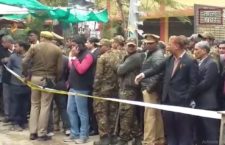Phula Devi, like most farmers from Banda district in Bundelkhand, waits for hours in front of the grain procurement center to receive payment for her produce. “The cheque doesn’t come for 6 months, the money hasn’t reached the farmer in 8 months. The farmer needs the money immediately for fertilizer and water supply. We keep doing rounds of the centre, but all they say is that there is no budget, only when that comes can we cut a cheque. This has been happening for almost 2 years now, the farmers are getting more and more anxious. We sold grain in December and only received the payment in May,” she says.
The primary marketing infrastructure for agricultural produce in the country consists of Principal Market Yards (PMYs) and Sub Market Yards (SMYs) set up by Agriculture Produce Marketing Committee (APMCs) in various states. Corruption is rampant in these centres, and mismanagement by officials has created adverse conditions that are forcing farmers to sell to private players and middlemen. Mahendra Tripathi, District Administrator, Kisan Union, Banda throws light on the working of the centres. “In the procurement of grains, one of the issues is that the farmer pays a very large wage to the palledars (labour) for crop handling. Legally it should be charged per quintal; anybody charging higher than that rate is committing a crime. Today, the situation is such that the rate is such that we pay Rs 50 for every 2.5 kilos of grain. This essentially means we are paying 2.5 times the rate- we keep demanding for a reduction in these rates, but the government does not seem to be listening to us. We understand that the labour works hard all year round, so we are ready to pay these exorbitant rates. Yet, our grain goes unpurchased. This is why we are forced to sell to middlemen and agents. The grain procurement centres are almost non-functional. A farmer has been waiting at one of these centres for 4 days now, the officials say that the grain will be purchased only when the gunny sacks are available.”
While on the one hand, the government promises to ensure the progress and welfare of farmers, on the other, it refuses to make proper arrangements for buying and selling of produce – the very livelihood of the farmer community. The condition of farmers in Uttar Pradesh does not present a pretty picture. Farm distress is getting worse in Bundelkhand region with at least 15 farmers committing suicide in Banda district in the month of July last year (2019). Bundelkhand has been facing a severe drought for years which is why crop failure is routine in the region. Therefore, farmers are doubly distressed – even if they manage to grow the produce, they have limited access to sustainable and fair means to sell their yield. “We sell to private buyers for instant payments. We work hard all day and night to grow the grain, but because there are no sustainable arrangements for purchasing of the grain, we are helpless at the hands of the government. Lots of farmers haven’t received payments from last year. The process at the procurement centre is such that our grain goes through 20 quality checks repeatedly because of which is only half of it is weighed. This is why we do not prefer selling our grain there. Another important issue is that we have many daily needs, in addition to things like clothes for children and medical emergencies. All of the money for these has to come from the revenue earned by selling our crops. It’s not like we have a steady source of income,” adds Mahesh Kumar, a farmer from Pangara Village.
An important driver that pushes farmers to choose private buyers over the government centres is the difference in the pricing mechanism. “If a farmer is kept waiting for so long, he is forced to sell it to the middlemen who offer higher rates. The centre purchases grain at Rs 750-800 per kilo, which is significantly lower than the arthi (middlemen) rate of Rs 1300-1500 per kilo. This 300-400 margin makes all the difference,” says Tripathi. The local farmers seem to agree with his reasoning. A case in point is Ram Kishore, a farmer from Naraini, “I sell my grain around here only. The government officials say that they only buy a certain type of grain and my produce doesn’t qualify. They don’t even set a clear rate and these private buyers are offering good money.”
When the farmers take their grain to the procurement centres, they often have to wait for weeks. They are fobbed off, saying there are no buyers or given excuses like the grain warehouses are full. The officials at the centre refuse to purchase grain on the grounds of overflowing granaries even though 60% of the grain lies in the farmers’ houses, with 40 days remaining for the selling season.
A farmer from Badhokar Khurd village, Phula Devi provides an account of the chaos that surrounds the procurement centres. “The delayed payments are forcing farmers to borrow constantly for immediate needs leading to debt. In fact, if the farmer refuses to sell the grain at the centre-determined rate, the officials dismiss it as poor quality grain, but if the farmer complies, they instantly purchase it. The farmers wait all night at these centres, if they aren’t up all night guarding their crops from stray animals. What is worse is that not all of them own tractors, so they have to return the ones they rented, which means that farmers suffer all night in the cold, sometimes for 8 days. They even have to take food and blankets to survive those days. Previously, the farmers were very willing to sell at these procurement centres but because of the rampant corruption, the situation is dire. If the officials checked the grain when it is at its best and pay Rs 200 / quintal as commission, things would be better. The palledars (labour) could be called in the morning and the grain could be weighed. Now, because we aren’t receiving payments, we are forced to borrow at high rates of interest for necessities like fertilizer and seeds. The conditions are so poor that people choose to marry their children to sons of lowly workers but not those of farmers’ sons. We don’t even have the money to educate our children and they don’t get jobs easily. There is no respect left for farmers.”
The plight of the farmers of Banda falls on deaf ears, seemingly. The commitment of the authorities to resolve these concerns seems to be superficial. Sanjiv Kumar, District Agriculture Official, says “There are no arrangements made for selling of the grain in the mandi. There are no records of any buying and selling. If any farmer has a complaint with the centres, they can file a complaint with the office and a solution will be found. “

